Potentials and Prospects of Beekeeping Entrepreneurship in Dinajpur Region: A Participatory Analysis
Md Akter Faruk Fuad1*, Md Nurhasan1 and Md Omar Kayess2
1Department of Agriculture Extension, Ministry of Agriculture, Bangladesh
2Department of Genetics and Plant Breeding, Hajee Mohammad Danesh Science and Technology University, Bangladesh
Submission:May 16, 2019; Published: June 06, 2019
*Corresponding author:Md Akter Faruk Fuad, Department of Agriculture Extension, Ministry of Agriculture, Agriculture Extension Officer, Debiganj, Panchagarh, Bangladesh
How to cite this article: Md Akter Faruk F, Md Nurhasan, Md Omar K. Potentials and Prospects of Beekeeping Entrepreneurship in Dinajpur Region: A Participatory Analysis. Agri Res& Tech: Open Access J. 2019; 21(5): 556178. DOI: 10.19080/ARTOAJ.2019.21.556178
Abstract
The present study was undertaken to assess the entrepreneurial potentials, scopes and opportunities of beekeeping in Panchagarh, Thakurgaon and Dinajpur districts under Dinajpur region during 1st November 2017 to 17th April 2018. Thus, a sample of 230 respondents from 23 upazilas was selected using simple random sampling for data collection using a pretested interview schedule. This paper mainly focused on basic concepts of beekeeping entrepreneurship, entrepreneurship skills, and needs of beekeeping entrepreneurship development in Bangladesh along with major reason for promoting beekeeping entrepreneurship development in the country. This study gave real existing scenario of problems and prospects of beekeeping entrepreneurship in Dinajpur region. Beyond improving beekeeper’s pragmatic knowledge through training; and establishing beekeeper associations, entrepreneurship and institutional, policy measures are needed to enhance this sector’s performance. Finally, the ultimate issue underlying the study is to provide some initiatives to building beekeeping entrepreneurship for expanding honey market, conserve biodiversity and finally getting judicial price.
Keywords: Potentials; Prospects; Beekeeping; Entrepreneurship; Participatory analysis

Introduction
Honey is the natural sweet substance produced by mutual interactions between bees and nectariferous plants. Beekeeping (apiculture) is the management of colonies of bees to produce honey and other hive products and for the pollination of crops. Beekeeping is the maintenance of honeybee colonies, commonly in hives, by humans. According to [1,2] beekeeping is a profitable enterprise. There is no negative impact of beekeeping on the environment. Many organizations have already undertaken beekeeping programmed as a good weapon for self-employment and poverty reduction for the rural people [3]. To sustain an ever-growing population’s health care and nutrition there is a prime significance of apiculture in our 4.6 billion year old planet. Traditionally, apiculture is seen as a low-tech honey collecting, processing and marketing industry with limited dynamics dominated by a few small family farms, which are mostly focused on making things better rather than doing new things.
Over the last couple of years, this situation has changed dramatically due to economic liberalization, a reduced protection of agricultural food price market and a fast changing consumer habits, product quality, chain management, food safety, sustainability and so on. These changes have cleared the way for new entrants, innovation and portfolio entrepreneurship besides sound management and craftsmanship, to be sustainable in the furthermore critical society. Recent studies show that apicultural entrepreneurship is not only dreaming or a new hype: it has a profound impact on honey business growth and survival. Entrepreneurship relates to finding ways and means to create and develop a profitable farm business. For rural poor livelihoods they dependent on subsistence agriculture and small farm lands often rely on alternative sources of income. Beekeeping is often promoted in the context of rural development because the practice provides monetary, nutritional, and social benefits to poor families, without requiring land ownership or large amounts of capital investment [4]. It can be practiced as an additional source of income for farmers in rural areas and has been successfully implemented in poverty-alleviating projects [5]. Beekeeping plays a major role in the socio-economic development of rural livelihoods [6,7]. The terms, entrepreneurship and agripreneurship are frequently used in the context of education and small business formation in agriculture. Dollinger [8] defines entrepreneurship in agriculture as the creation of an innovative economic organization for the purpose of growth or gain under conditions of risk and uncertainty in agriculture.
The growing domestic demand for high value agricultural products like honey related substances could provide significant opportunities for greater rural employment and incomes as the production of many of these commodities tends to be relatively labor intensive. A look at the research trends reveals that, studies on beekeeping entrepreneurship are mainly focused on assessing the entrepreneurial skills and entrepreneurial behavior. As such, very few studies are available on entrepreneurial potential and there is a huge gap in our understanding of how innate the potential of a person interacts with conductive environmental factors to give rise to successful beekeeping entrepreneurs. Even though some studies have been conducted in Bangladesh on adoption of beekeeping technologies, there are no studies on the extent to which beekeepers turn into entrepreneurs and on their entrepreneurial potential in Dinajpur region
Justification of the study
This paper leads to optimize the available opportunities along with the recovery of problems and constraints by achieving the following advantages of beekeeping entrepreneurship development in Dinajpur region as well as Bangladesh. This habitat is spilling over with numerous unemployed people with potentiality in the periphery. By certifying beekeeping entrepreneurship development; day by day we can ensure small to medium to big industrialization, market formation, innovation, balancing wealth distribution with marginal development, innovative product and services, increasing living standard and certainly maximum utilization of natural resources by using technology.
Objective of the study
The ruling focus of this study identifies the pros and cons of apiculture entrepreneurship development in Dinajpur region as well as Bangladesh. Precisely the study attempts to attain the following objectives: a. To study the socio-economic and communication characteristics of beekeepers. b. To assess the relationship between socio-economic and communication characteristics and their entrepreneurial potential. c. To scrutinize the availability of scope and opportunities with providing some recommendations for expansion of beekeeping entrepreneurship development
Materials and Methods
This study was conducted during 1st November 2017 to 17th April 2018 at total twenty three upazilas of Panchagarh, Dinajpur and Thakurgaon districts under Dinajpur region. Total 230 respondents those are directly or indirectly involve with beekeeping from 23 upazilas (10 respondents per upazila) was selected using simple random sampling for data collection. In order to carry on this work and to find out the objectives that will be quantitative in nature, descriptive research design has been tackled. A detailed structured interview schedule was used as a tool for data collection. Interview schedule consisting of open-ended questions was developed for collecting data from the respondents. The interview schedule was prepared in English and was translated into bangle before administering it to the respondents. For the purpose of study, an entrepreneurial potential scale with 30 statements combined with five components; viz: innovativeness, economic motivation, need for achievement, risk taking ability and self-confidence (measuring instrument) was developed and analyzed exclusively for beekeepers to know beekeeping potentials [9]. Adopted this type of scale. Each respondent was asked about respected questions with corresponding assigned scores. By obtained score -age, education, family size, farm size, farming experience, annual income, extension agency contact, organizational participation, innovativeness, cosmopoliteness, potentials and major problems in beekeeping, factors that influence entrepreneurship, hinders of beekeeping entrepreneurship were measured [10-14]. Used similar type of scales. Percentage values were calculated to make simple comparison.
These were calculated by dividing the frequency of particular cell by total number of beekeepers and multiplying by 100.

Where, f = Frequency of particular cell; n= Total number of beekeepers; P= Percentage
Coefficients of correlations (r) were computed to explore the relationships between selected characteristics of the respondents and their beekeeping entrepreneurship. Throughout the study five percent (0.05) level of probability was used to accept or reject the null hypothesis.) [15] was adopted this type of scale.
Results and Discussions
Present scenario of beekeeping entrepreneurship in Dinajpur region
Beekeeping in the study area has been practiced as sideways with other agricultural activities. Based on the study, there were no any respondents who base their livelihood only this sector. It is an age-old tradition; there honey production is a lucrative business, economically profitable enterprise and it generates employment opportunities for generation to generations. There is enough scope for taking up beekeeping as a commercial scale. Around 6,630.67 sq. km area under Dinajpur region, it’s very difficult to find out the actual figure of total beekeepers with their boxes due to migratory beekeeping in nature.
Potentiality of beekeeping enterprise at a glance
Each respondent was asked about the potentiality of beekeeping in their locality and the main reasons were listed down here: a. Weather is favorable for beekeeping. b. There are so many nectar and pollen producing plants grown here. c. No need of extra land in beekeeping. d. This is not high technological matter. e. An illiterate person can start this enterprise by taking training only for one week f. Honey is not perishable good; so, farmers can easily store it. g. It is an environment friendly enterprise. h. Source of extra income, which helps to improve the standard of living. i. Employment creation by extending the beekeeping in rural areas.
From the Table 1, revealed that most of the respondents were middle aged, educated up to secondary level, had small farm with medium farming experience and in low income category. On the other hand, they were in medium category of extension agency contact, organizational participation, innovativeness and cosmopoliteness.
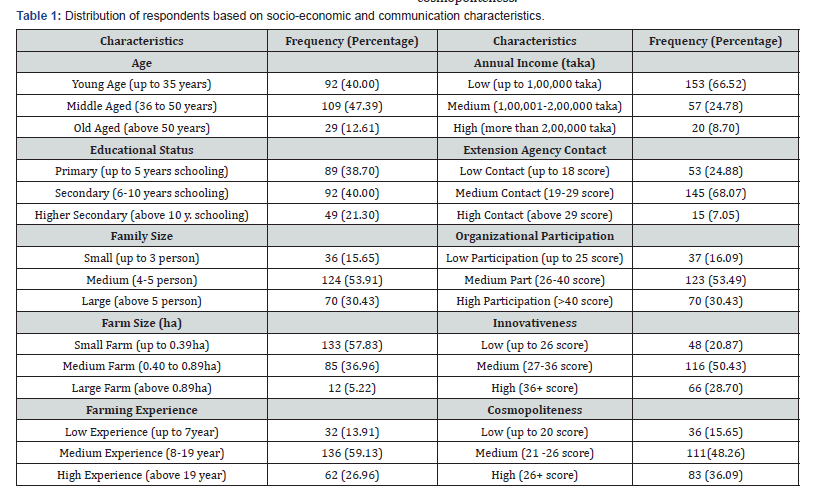
The findings in Table 2 indicated that education, organizational participation and innovativeness of the respondents showed significant positive relationships with their beekeeping entrepreneurship and the respective r values are 0.299**, 0.222* and 0.412** respectively. The results imply that with the increase in education, organizational participation and innovativeness of the respondents there would be an augmentation in adoption of beekeeping entrepreneurship practices.
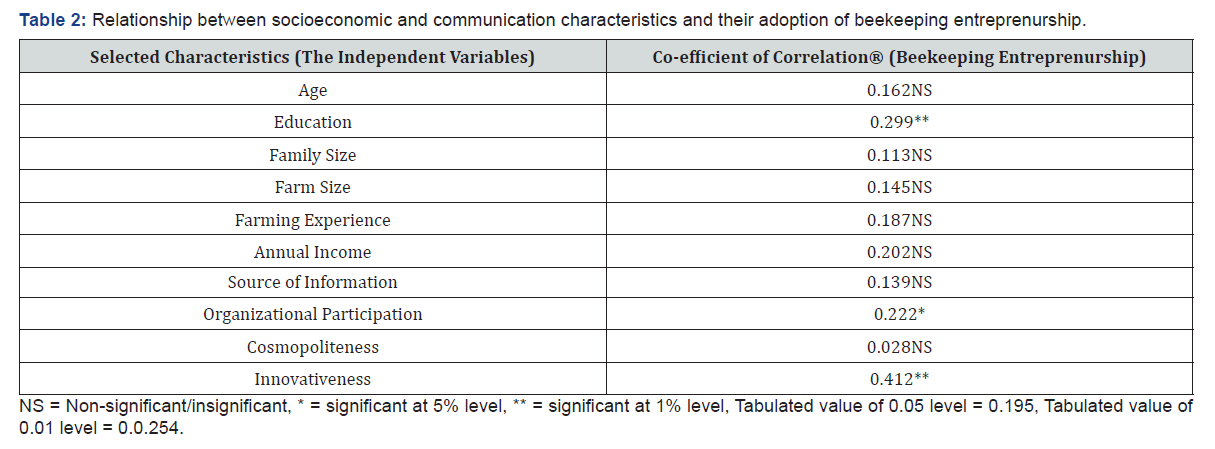
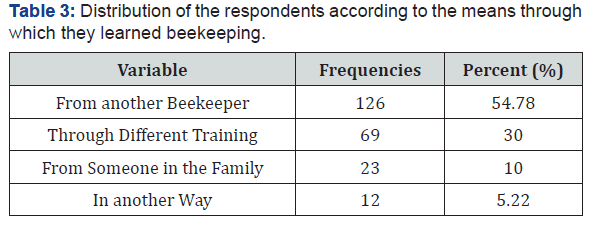
The results in Table 3 showed that it is very useful for a beginner to have alongside someone experienced in beekeeping, as 54.78% of the respondents stated that they learned most things necessary for practicing beekeeping from another beekeeper, whereas 30.00% of the respondents stated that they have learned most things required for practicing beekeeping from Through different training programs.
Antifungal resistance
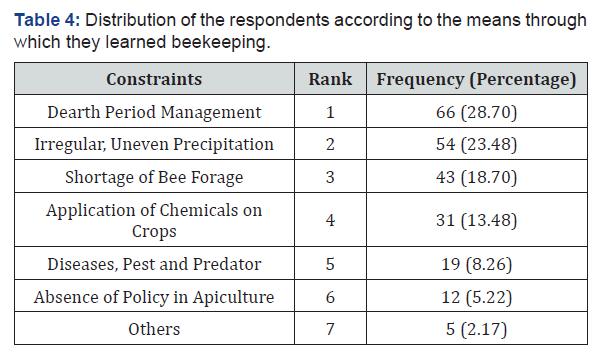
The major problems of beekeeping are illustrated in Table 4 where the results show that it is very useful for a beginner to have alongside someone experienced in beekeeping, as 54.78% of the respondents stated that they learned most things necessary for practicing beekeeping from another beekeeper, whereas 30.00% of the respondents stated that they have learned most things required for practicing beekeeping from through different training programs. Different types of diseases, pests are seen at beekeeping, which can drastic loss in business. According to the respondent’s responses major pests, predators are ants, mite, birds, etc. was listed in Table 5.
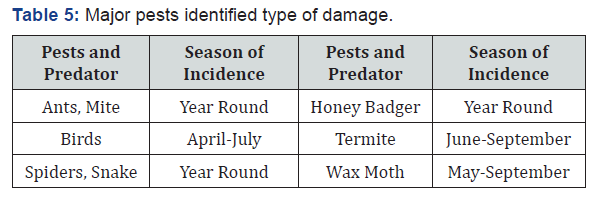
Entrepreneurship and beekeeping
Entrepreneurship is defined as the discovery and evaluation of opportunities [16] as well as the creation of new opportunities and possibilities [17]. For planned economic development; individuals or group enterprise and initiatives were encouraged, assisted, guided and regulated in various ways by nationally. The idea behind this was that persons who have little financial resources or managerial background could be induced to start small enterprises, which would be effective tools for widening the entrepreneurial base in the country. Agro-based industries provide an excellent opportunity to the farmers for local entrepreneurship and employment generation, thus improving their socio-economic conditions. Beekeeping is one of the best examples for building entrepreneurship by employment creation, resources utilization, income generation and bring promoting change in a gradual and peaceful manner. By the respondent’s opinion from Table 6 ‘Financial benefits’ was the prime reason for influence to be beekeeping entrepreneurship rather than ‘The strategy to export bee products’, ‘Reason for practicing beekeeping’ etc.
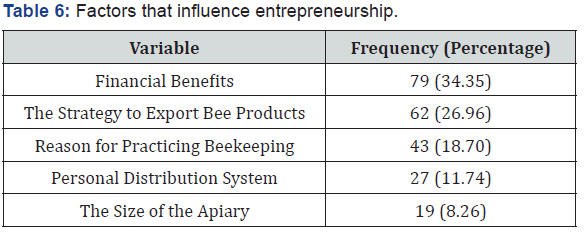
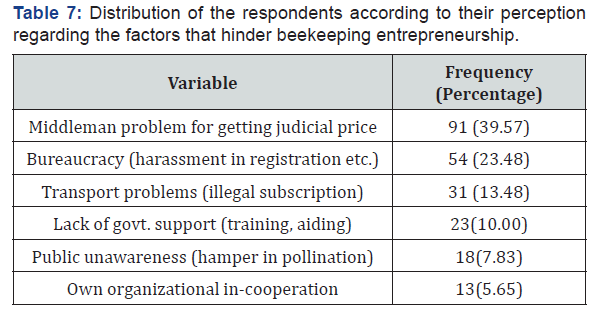
Entrepreneurship for the rural population is important to provide alternative occupations as against the rural migration. Despite of the simplicity of beekeeping entrepreneurship and its tremendous advantages as well as its potential of providing honey production, enhance pollination and most importantly employment; since beekeeping in migratory in nature, even the landless farmers can take up this profession; some hinders from Table 7 remain in beekeeping entrepreneurship; such as middle man problem for getting judicial price, bureaucracy (harassment in registration etc.) etc. are the top most problems rather than lack of govt. support (training, aiding), public unawareness (hamper in pollination), own organizational in-cooperation.
Conclusion
Although traditional beekeeping has come a long way, there are certain implications that must be addressed in regional as well as national socioeconomic changes and nutritional security. Apiculture sector needs well-functioning markets to drive growth, employment and economic prosperity in rural areas of the country and to provide dynamism and efficiency into the marketing system, sound technical investments are required for beekeeping entrepreneurship development.
References
- Syngkon W (2017) Problems and Prospects of Beekeeping at Khatarshnong in Meghalaya. Intl Advance Res 5(8): 611-617.
- Verma S, Attri PK (2008) Indigenous beekeeping for sustainable development in Himachal Himalaya. Indian Journal of Traditional Knowledge 7(2): 221-225.
- Saha GC (1990) Beekeeping for Rural Development, its Potentiality and Beekeeping against Poverty- Bangladesh Perspective Standing Commission of Beekeeping for Rural Development. Project Director, Beekeeping Project, BSCIC 139 (5th floor), Apimondia, p. 1-6.
- Yap NT, Devlin JF (2015) Beekeeping innovation for sustaining rural livelihoods. A success story. Intl J Innovation Sustainable Dev 9(2): 103-117.
- Lietaer C (2009) Impact of beekeeping on forest conservation, preservation of forest ecosystems and poverty reduction. In: XIII World Forestry Congress, p. 18-23.
- Joni V (2004) The Possibilities and Constraints of Improving Livelihoods Through Apicultural Development in Ranomafana National Park in Madagascar, University of Helsinki, Finland.
- Bairwa SL, Lakra KS, Kushwaha S, Meena LK, Kumar P (2014) Agripreneurship Development as a Tool to Upliftment of Agriculture. Int J Sci Res Pub 4(3): 1-4.
- Dollinger MJ (2003) Entrepreneurship-Strategies and Resources. Pearson International Edition, New Jersey, USA.
- Esakkimuthu M, Kameswari VLV (2015) A Scale to Measure Entrepreneurial Potential of Beekeepers. Intl J Farm Sci 5(1): 188-193.
- Islam MR, Chhay L, Mian MM, Nasry AANB (2016) The Financial Analysis of Apiculture Profitability in Bangladesh. Asian J Agril Exten Econo Socio 9(2): 1-8.
- Kalanzi F, Nansereko S, Buyinza J, Kiwuso P, Turinayo Y, et al. (2015) Socio-economic Analysis of Beekeeping Enterprise in Communities Adjacent to Kalinzu Forest, Western Uganda. Intl J Res Land-use Sustainability 2: 81-90.
- Baltazar ML, Namwata BML, Mdundo KJ, Malila MN (2013) Potentials and Challenges of Beekeeping Industry in Balang’dalalu Ward, Hanang’ District in Manyara, Tanzania. Kivukoni J 1(2): 75 -93.
- Popa AA, Mărghitaş LA, Pocol CB (2012) Determinants of Entrepreneurship in the Beekeeping Sector in the North-West Region of Romania. Bulletin UASVM Horticulture 69(2): 266-273.
- Moniruzzaman M, Rahman MS (2009) Prospects of Beekeeping in Bangladesh. J Bangladesh Agril Unv 7(1): 109-116.
- Esakkimuthu M, Kameswari VLV (2017) Entrepreneurial Potential of Small-scale Beekeeping in Rural India: A Case in Kanniyakumari district, Tamil Nadu. Trop Agril Res 28(4): 411-424.
- Shane S (2004) A General Theory of Entrepreneurship: The Individual-Opportunity Nexus. Edward Elgar Publishing Incorporated, Northampton, US.
- York JG, Venkataraman S (2010) The entrepreneur–environment nexus: Uncertainty, innovation, and allocation. J Business Venturing 25(5): 449-463.






























